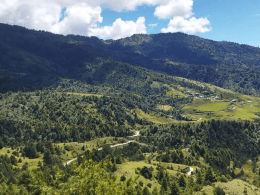Policymakers, scientists and development experts from across the Hindu Kush Himalaya (HKH) region have called for stronger cross-border cooperation to scale up nature-based solutions as a frontline response to the escalating climate crisis affecting one of the world’s most fragile mountain ecosystems.
The appeal came during the third HKH Science-Policy-Finance dialogue held in Paro, which brought together around 80 participants representing ICIMOD member countries. The forum highlighted the urgent need to integrate nature-based approaches — such as watershed restoration, ecosystem rehabilitation and sustainable land management — into regional climate strategies to reduce vulnerability and build long-term resilience.
Experts at the gathering stressed that nature-based solutions (NbS) offer practical and cost-efficient tools to address a range of interconnected challenges, including water insecurity, disaster risks and declining rural livelihoods. With the HKH region warming at a rate faster than the global average, the stakes are rising for communities that depend on its glaciers, rivers and biodiversity.
The dialogue underscored that the environmental pressures facing HKH countries do not stop at national borders. Accelerated glacier melt, loss of species, land degradation and unpredictable weather patterns were identified as shared concerns that demand coordinated planning and collective action rather than isolated national responses.
Bandana Shakya, one of the key voices at the forum, emphasized that fragmented efforts are no longer sufficient. She noted that a cohesive regional framework for NbS is essential to unlock their full potential, streamline investments and ensure that solutions are implemented at a scale that matches the magnitude of the crisis.
Organizers stated that the outcomes of the dialogue will shape a set of strategic recommendations aimed at expanding successful nature-based initiatives, identifying and mapping existing solutions across the region, and strengthening partnerships among governments, scientific institutions and financial stakeholders.
The event was jointly organized by the International Centre for Integrated Mountain Development (ICIMOD) in collaboration with Bhutan’s Ministry of Energy and Natural Resources, reinforcing a growing commitment to unite science, policy and finance in safeguarding the future of the Hindu Kush Himalaya.
As climate impacts intensify, participants agreed that embracing nature as an ally — rather than exhausting it — may prove to be the region’s most powerful tool in securing sustainable development and resilience for generations to come.








